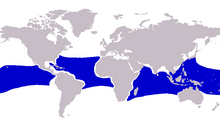闊步鰺
| 闊步鰺 | |
|---|---|

| |
| 科學分類 | |
| 界: | 動物界 Animalia |
| 門: | 脊索動物門 Chordata |
| 綱: | 條鰭魚綱 Actinopteri |
| 目: | 鰺形目 Carangiformes |
| 科: | 鰺科 Carangidae |
| 屬: | 鰺屬 Caranx |
| 種: | 闊步鰺 C. lugubris
|
| 二名法 | |
| Caranx lugubris | |

| |
| 異名 | |
| |
闊步鰺(學名:Caranx lugubris),又稱黑鰺、甘仔魚,為輻鰭魚綱鱸形目鱸亞目鰺科的其中一個種。
分類及命名
[編輯]本魚分類歷史非常複雜,該物種首先被誤稱為Scomber adscensionis(Osbeck,1771),它也被用來描述現在所謂的Pseudocaranx dentex。[2]Georges Cuvier在1833年將該物種描述為Caranx ascensionis。然而,目前已知的物種,首先是古巴動物學家費利佩·波伊在他的兩部作品《古巴自然歷史古蹟》[3]或《古巴島自然歷史》中科學描述的。他將該物種分類至Caranx屬,並給出了拉丁語特有的lugubris加詞,意思是「悲傷」。[4]雖然描述的基礎是來自古巴的一種魚,但該物種沒有任何模式種。Poey最初將他的物種描述為與Cuvier的C. ascensionis不同,然而他後來將C. lugubris和另一個他命名為C. frontalis的物種與C. ascensionis同義。在後來的工作中,Poey再次將這三個名字列為同義詞,但將C. lugubris視為有效,並指出Cuvier的名字也被用於Pseudocaranx dentex。大多數後來的分類修訂支持Poey的判斷。 William Smith-Vaniz和John Randall於1994年向ICZN提出了一項建議,正式將C. lugubris定為物種名稱,於1996年被接受。[5]
分布
[編輯]
本魚廣泛分布於全球各大洋之熱帶及亞熱帶海域。
深度
[編輯]水深12至135公尺。
特徵
[編輯]本魚體呈橢圓形而側扁,背側輪廓比腹側輪廓更凸,這種凸起在頭部最明顯,其向下傾斜,使頭部輪廓具有稜角的外觀。[6]與同屬的其他成員相比,嘴巴相當大,上頜骨延伸到魚眼的中心。[7]上頜包含一系列堅固的外部犬齒,內部帶有較小的牙齒,而下顎包含一排寬間隔的錐形牙齒。幼魚體色較銀白,成魚體成灰黑色,側腺直走部長度大於弧形部約1/3;胸鰭向後延長,可達臀鰭第十軟條上方。第一背鰭有硬棘8枚,第二背鰭有條20至21枚;臀鰭有硬棘2枚,軟條約17至19枚。體長可達75公分,體重可達17.9公斤。[8]
生態
[編輯]
本魚為亞熱帶或熱帶海域的兇猛掠食性魚類,單獨或成群活動,幼魚以魚類或甲殼類為食。成魚幾乎都以魚類為食。[9]雄魚及雌魚比例為1:0.55,表明雄性幾乎是雌性的兩倍。[10]雌性為34.6公分,雄性為38.2公分達性成熟,產卵的時間尚不清楚,發生在2月,4月,5月和7月至9月。
經濟利用
[編輯]為具有商業價值的食用魚,[11]通常用鉤釣或圍網捕獲,通常以生鮮、醃製或曬乾販售,幼魚美味,成魚肉甚硬,只能做生魚片,不過具有雪卡魚毒的紀錄。[12]
參考文獻
[編輯]- ^ 中國科學院動物研究所. 阔步鲹. 《中國動物物種編目數據庫》. 中國科學院微生物研究所. [2009-04-16]. (原始內容存檔於2016-03-05).
- ^ Smith-Vaniz, W.; Randall, J. Scomber dentex Bloch & Schneider, 1801 (currently Caranx or Pseudocaranx dentex) and Caranx lugubris Poey, [1860] (Osteichthyes, Perciformes): proposed conservation of the specific names. Bulletin of Zoological Nomenclature. 1994, 51 (4): 323–330 [2019-05-08]. ISSN 0007-5167. doi:10.5962/bhl.part.7236. (原始內容存檔於2020-11-14).
- ^ Poey, F. Memorias sobra la historia natural de la Isla de Cuba, acompañadas de sumarios Latinos y extractos en Francés 2. Havana. 1860: 97–336.
- ^ Online Etymology Dictionary. lugubrious. 2001 [2009-10-13]. (原始內容存檔於2017-07-13).
- ^ International Commission On Zoological Nomenclature. Scomber dentex Bloch and Schneider, 1801 (currently Caranx or Pseudocaranx dentex) and Caranx lugubris Poey, (1860) (Osteichthyes, Perciformes): Specific names conserved. Bulletin of Zoological Nomenclature. 1996, 53 (2): 140–14 [2019-05-08]. ISSN 0007-5167. (原始內容存檔於2020-11-14).
- ^ Lin, Pai-Lei; Shao, Kwang-Tsao. A Review of the Carangid Fishes (Family Carangidae) From Taiwan with Descriptions of Four New Records. Zoological Studies. 1999, 38 (1): 33–68. (原始內容存檔於2012-02-29).
- ^ Randall, J.E. Caribbean Reef Fishes Third. Hong Kong: T.F.H. Publications, Inc. Ltd. 1996: 368. ISBN 978-0-7938-0117-6.
- ^ International Game Fishing Association. Database of IGFA angling records until 2001 (As made available to FishBase). Black jack, Caranx lugubris. Fort Lauderdale, USA. 2001 [2009-10-14]. (原始內容存檔於2020-04-01).
- ^ DeBose, J.L.; Nevitt, G.A. Dimethyl-sulfoniopropionate - A Potential Aggregation Cue for Pelagic Jacks [abs]. Ocean Sciences Meeting Abstracts. 2006, 87 (36): 1.
- ^ Munro, J. L. The Biology, Ecology and Bionomics of the Jacks, Carangidae. Caribbean Coral Reef Fishery Resources (A second edition of The biology, ecology, exploitation, and management of Caribbean reef fishes : scientific report of the ODA/UWI Fisheries Ecology Research Project, 1969-1973, University of the West Indies, Jamaica.). Manila: International Center for Living Aquatic Resources Management. 1983: 82–94 [1974]. ISBN 971-10-2201-X.
- ^ Mead, P. Report on the second visit of the South Pacific Commission Deep Sea Fisheries Development Project to Niue. SPC Report. 1980, 724/80: 1–28.
- ^ Pottier, I.; Vernaux, J.P.; Jones, A.; Lewis, R.J. Analysis of toxin profiles in three different fish species causing ciguatera fish poisoning in Guadeloupe, French West Indies 19 (11): 1034–1042. 2002. doi:10.1080/02652030210155378.

